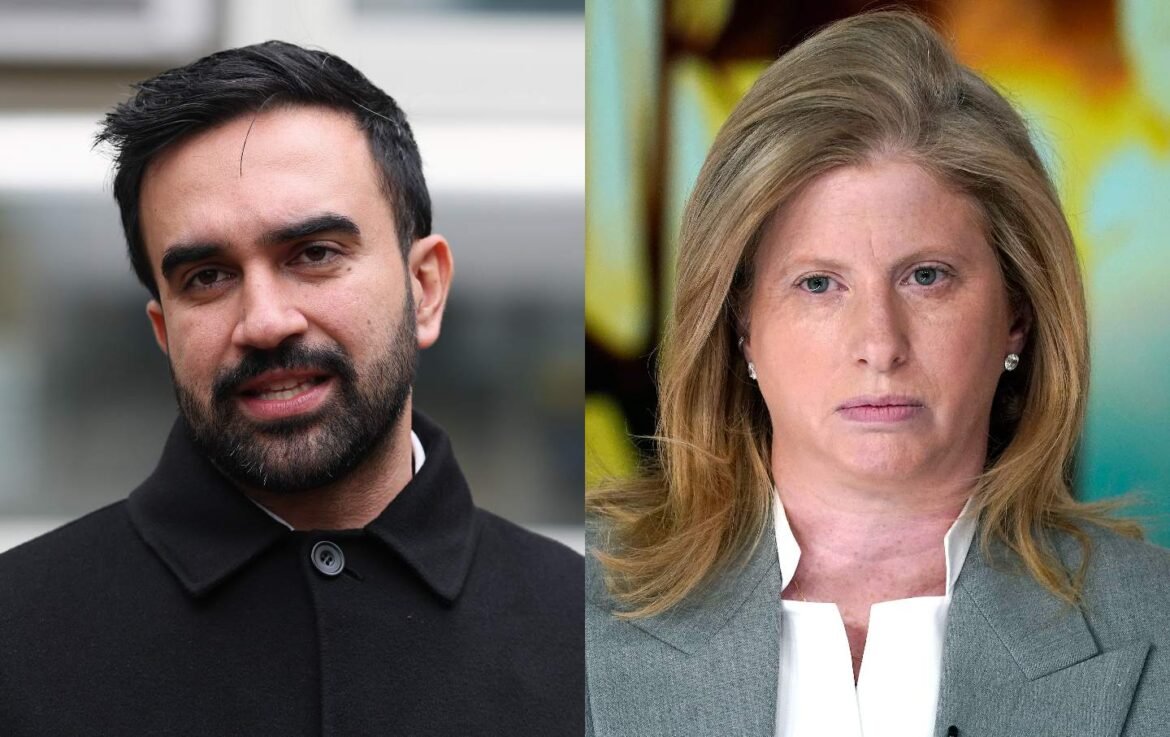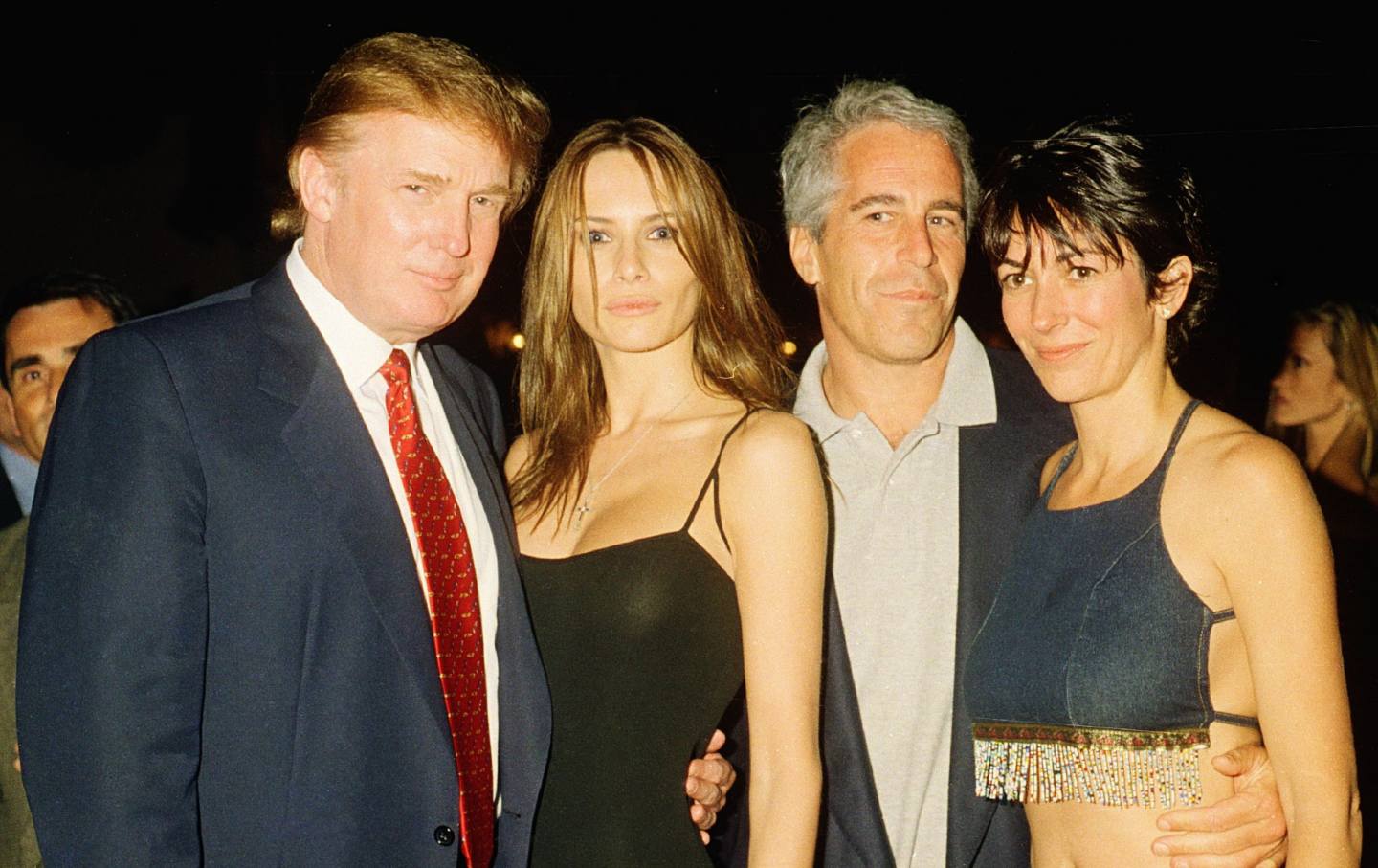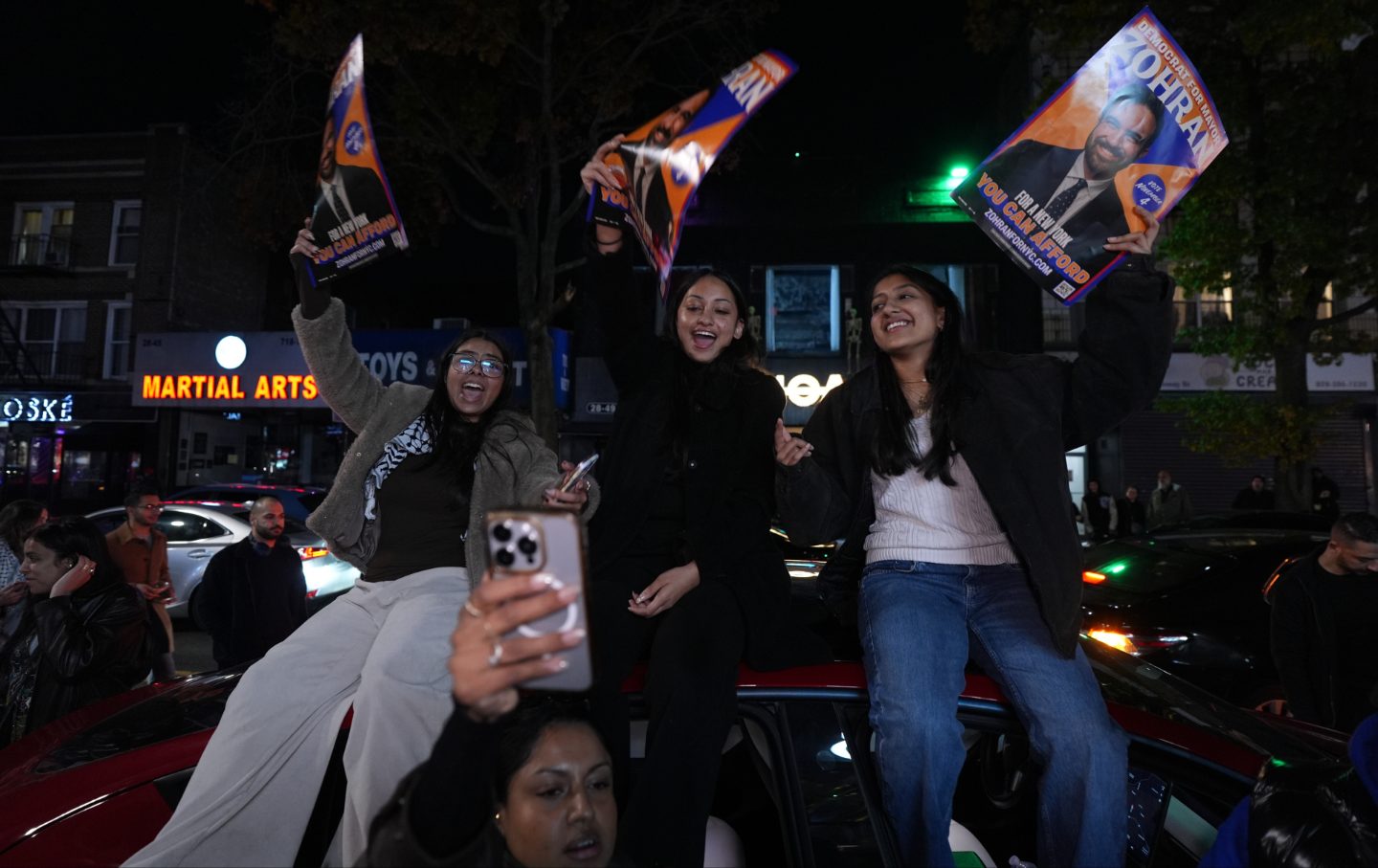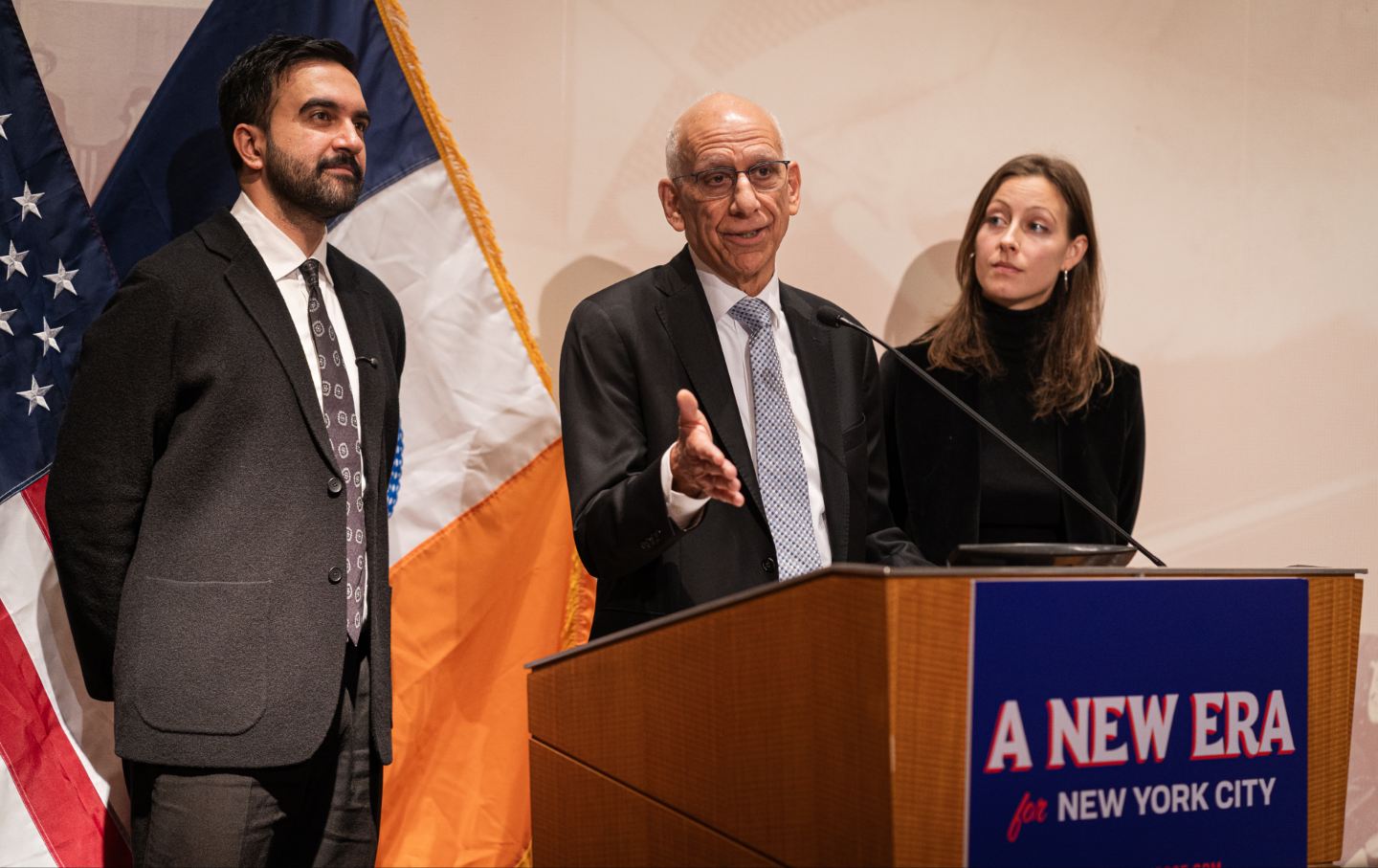In cities across America, a new generation of left-wing mayors is confronting the same dilemma: What do you do when you inherit institutions designed to crush left movements like those that carried you into office? Socialist campaigns promise to challenge the power of capital, but upon taking office, left executives find themselves constrained by police unions, business interests, and state politicians eager to appear tough on crime. Does anyone have a good plan to push back?
In New York City, we’re about to find out—starting with the cops.
In the run-up to his election as mayor, Zohran Mamdani said he would keep Jessica Tisch—a billionaire heiress who has rolled back police reforms and collaborated with ICE—as NYPD commissioner. He repeated that pledge after his victory last week. Five years ago, Mamdani called the NYPD “racist, anti-queer,” “wicked,” and “corrupt.” After being forced to apologize for these comments, and pledging his support for the police, he’s now saying that he and Tisch can work together. This decision has drawn criticism from Mamdani’s supporters, and leftists have good reason to be concerned about Tisch’s record. Yet instead of viewing this as a betrayal, we should think of it as proof of how much power police have in local politics—and how little power the left holds.
Business elites demand aggressive policing because it establishes what they see as proper order, a prerequisite for commercial investment. To quote former NYPD Commissioner Bill Bratton, police “flush” homeless and other ostensibly disposable people “off the street” to fuel development and displacement. The ultra-rich aren’t being subtle about this. “Public safety is the number one fiscal stimulus,” one hedge fundie told Bloomberg just after Mamdani’s election.
The playbook is national. In San Francisco, Big Tech and real estate money toppled reform DA Chesa Boudin; in Minneapolis, defunding efforts were defeated in part by business and police union advocacy (though the full story is more complex). The message travels: Undermine police power, and capital will move to punish you—at the ballot box, in the press, and through state preemption.
Because Mamdani’s campaign is now the test case for progressive governance, how he manages the NYPD will have enormous consequences for left organizing across the country. But ultimately, what happens will be less down to Mamdani’s choices than to ours. Without movements strong enough to either pressure or protect them, any left politician is bound to yield to these interests—and Mamdani is no different. We won’t be able to push Mamdani, or anyone else, to undermine police power unless we become a force to be reckoned with.
Who is Jessica Tisch, anyway? An heiress of the Loews Corporation, Tisch entered public service in 2008, working within the NYPD intelligence division that helped build a vast surveillance network targeting Muslims. Adams tapped her as commissioner in late 2024 after his earlier picks fell afoul of federal corruption probes. Tisch rooted out some cronyism in the department, and she has taken credit for subsequent declines in shootings, though New York may only be following a nationwide trend.
But Tisch has also practiced a firmly old-guard version of policing in ways that underscore just how strange a bedfellow she is set to be with Mamdani: adopting Bill Bratton’s broken windows policing practices, defending the city’s racist gang database, overseeing a training that labels the keffiyeh antisemitic, and collaborating with ICE to crush pro-Palestine protests. Against the available evidence, she blamed modest steps like bail reform and Raise the Age for post-pandemic crime spikes. She is also a staunch Zionist who has defended the NYPD’s brutal policing of Palestine protests, whereas Mamdani is an advocate for Palestinian liberation. And Tisch’s family members spent over a million dollars opposing Mamdani’s election.
So what explains their fragile alliance? In a word: power.
After Mamdani won the Democratic primary, the richest New Yorkers threw tantrums and lit money on fire. When Mamdani set out to assuage their fears, the scions of capital settled on one demand: Keep Tisch in her job. Adding to the pressure, Democratic party leaders initially stayed silent. Figures from Kathy Hochul to Hakeem Jeffries reportedly conditioned their endorsements on keeping Tisch. Faced with this onslaught, Mamdani yielded. If he wanted to turn his upstart campaign into a bona fide Democratic coalition, it seemed, he had no other choice.
Fulfilling their end of the Faustian bargain, Hochul awkwardly yet earnestly joined Mamdani at campaign rallies, and Kathy Wylde, one of the local ruling class’s most influential power brokers, began saying that perhaps all sides could find a way to work together. Now we will all see whether that’s true.
How should leftists interpret these developments? Writing in The Nation last July, writer and policing expert Alex Vitale discouraged Mamdani from keeping Tisch, arguing that she would “never truly ally with him.” After Mamdani confirmed that he wanted to keep Tisch, journalist Ken Klippenstein said Mamdani had chosen a “straitjacket,” while Spencer Ackerman called the decision a “big mistake,” noting that “Tisch cooperated with ICE to lock up Leqaa Kordia.”
I also do not see Mamdani and Tisch as natural allies, and I agree that Tisch’s collaboration with ICE was repugnant. Yet there is a clear explanation for Mamdani’s decision: There was no organized opposition. There wasn’t even a rumored alternative to Tisch, let alone a concerted campaign to propose one.
The left doesn’t build talent pipelines for police brass, and I’m not arguing that we should start. We want to reduce police resources, staffing, and technology. Yet our inaction meant Mamdani saw no constituency for another choice.
More broadly, the left has yet to recover from the backlash against the George Floyd uprising, and any honest observer would admit that regaining the momentum that crested in 2020 will require quite a bit of organizing. The consequence of all of this is that there was no significant counterweight to the immense forces urging Mamdani to stick with Tisch—and to repudiate his former stances on policing. Is it any wonder that he gave way?
The core battle over Tisch—and the political necessity of conceding, at least in part, to police power—appears to have been lost. But that doesn’t mean there is nothing the left can do. Instead of expending energy on battles we already decided not to fight, we should scrutinize what Mamdani’s NYPD does differently in 2026. We must ensure that Mamdani stays true to the promises he made: abolishing the Strategic Response Group (SRG), cutting overtime spending, and creating a Department of Community Safety. (SRG’s top officer filed for retirement the day after Mamdani won.)
Mamdani apparently recognizes that Tisch is a savvy politician. Her mentor and former top cop Bill Bratton describes himself as a political broker—it’s part of the job description. But he has political skills of his own. When Hell Gate asked Mamdani how he reconciled Tisch’s agenda with his own, his response was wry: “I think everyone will follow my lead—I’ll be the mayor.” Time will tell whether can stay three steps ahead of Tisch and her backers.
The first major hurdle for this relationship may come alongside any major Palestine-related action in 2026. Mamdani’s support base overlaps with Palestine activists—he started a Students for Justice in Palestine chapter in college—so it’s hard to imagine that he would be enthusiastic about police cracking student skulls or swarming Bay Ridge, as they did under Eric Adams. At the same time, Tisch is committed to brutal protest policing. Mamdani’s coalition will be severely, perhaps fatally, damaged if he winds up overseeing that kind of assault. He’s already working on an alternative protest-policing approach, but implementing it will be an early, defining test.
One constituency was remarkably quiet amid the battle to control the NYPD: the NYPD’s largest union, the Police Benevolent Association (PBA). The PBA endorsed no one in the mayoral race and stayed silent on Tisch. Given the PBA’s outsize influence on New York politics, its silence is deafening—and cannot be expected to last long.
How might we expect the PBA to greet its new Muslim socialist boss? Its relationship with New York’s first Black and democratic socialist mayor provides some clues. David Dinkins clashed with the PBA over his proposal to make the Civilian Complaint Review Board an independent, civilian-controlled agency. In 1992, the PBA organized an opposition rally of thousands of cops that devolved into a drunken riot, complete with cops shouting slurs and storming City Hall.
Bill de Blasio, whose campaign emphasized police reform more than Mamdani’s, also fought the police unions (and lost). Cops turned their backs on de Blasio and walked off the job—a classic police tactic, given that work slowdowns generate headlines reinforcing the myth that police pullbacks endanger residents. The nadir of the relation between police and de Blasio came during the 2020 protests, when a police union gleefully posted a report of Chiara de Blasio’s arrest—an incident likely on Mamdani’s mind, as he hired additional security after Islamophobic threats.
The battle over Tisch may not be a primary focus for police unions (though the Sergeants Benevolent Association thinks Tisch should stay). The only major play that the unions have made so far is forcing Mamdani to apologize for calling them racist—hardly a controversial claim, as Eric Adams famously founded an organization drawing attention to the issue, but one Mamdani walked back nonetheless.
On the one hand, perhaps police see Mamdani’s modest reform promises as tolerable. On the other hand, perhaps they are waiting for an opportune moment to press for what they always want: more money and less accountability.
Could the proposed Department of Community Safety cause a fight over city resources? Mamdani often notes that police are stuck with work they don’t want, like mental-health crisis response. But across the country, police fight to maintain their professional authority. In Baltimore, violence interrupters work to stop retaliatory violence. Because they won’t share real-time street information with cops, relations are tense. Police view interrupters as criminals, and interrupters feel that they have become targets of police sabotage. If the new department competes for dollars, expect police backlash—the NYPD arrested two interrupters last year.
Maybe Mamdani keeps Tisch and compels her to carry out reforms; maybe she storms off and the press calls it a crisis. Either way, what happens next will measure the left’s real strength.
If she walks, organizers should move to block any consensus around a status-quo safety agenda. The task will be to give Mamdani political cover to appoint a commissioner actually willing to implement his program.
If she stays and complies, we should be ready to push for more ambitious demands: reduced NYPD technology and surveillance capacity, the end of the gang database and status-quo approaches to gang policing, and budget and headcount reductions. We are in the unfortunate position of needing to organize like hell just to claw back the status quo we enjoyed in 2019—the city jail population nearly doubled under Adams.
In either scenario, we will need to become stronger. The defund movement in NYC was ruthlessly crushed and co-opted—this is part of why the billionaires are able to choose what happens with the NYPD.
Popular
“swipe left below to view more authors”Swipe →
Organizers focused on criminalization may need to engage in electoral work more often. Mamdani is ostensibly accountable to NYC-DSA, for example. Mamdani’s allies have also created a nonprofit to continue the momentum of his campaign, which is focused on affordability—but has made no mention of organizing around safety. There may be a case for joining such organizations to push internal decision-making to address policing and incarceration.
Labor action is another important tactic. Across the country, police and corrections officers use wildcat strikes to resist accountability and retaliate against criminalized people. Strikes work! Aligning labor with anti-police organizing magnifies leverage. Twentieth-century movements succeeded by disrupting capital to force politicians’ hands. The New Deal and the Civil Rights Act were the result of militant, disruptive mass action. Effective tactics may seem uncivil or illegitimate—that’s too bad for the respectability police.
Organizing efforts could dovetail with Mamdani’s agenda. The Department of Community Safety will demonstrate the potential of non-police approaches. That said, the administration’s ability to move towards abolitionist horizons depends on our power.
In an ideal world, Mamdani’s coalition would be so robust that we could insulate him from the fallout of calling the NYPD’s bluff when it walks off the job—or firing Tisch if she refuses to budge on more ambitious steps. Indeed, throwing Tisch under the bus at an opportune moment could be a great play to undermine the prospects of a potential threat in the next election.
What we learn from the billionaires’ insistence on Tisch is that, while they’ll merely grumble about a leftist agenda on the cost of living—and, potentially, higher taxes—they are not prepared to brook dissent on the running of the policing machine. This is true in every city where progressives are gaining power. To build a government that serves working people, police power must be challenged. Winning the election was an accomplishment, but the NYPD didn’t even see it as a fight worth joining. That means the real battle still lies ahead.
Now is the time to find a political home for that battle. Everyone has skills that can contribute to the cause. Perhaps it’s taking notes in union meetings, signing up for ICE-watch training, or phonebanking to keep voters engaged. Even one small task matters.
Mamdani can’t beat the NYPD alone. No politician can. The only way to break the cops’ choke hold on city politics is to become stronger than them. Tisch’s tenure should remind us what’s at stake: Until the left can build and sustain real power in the streets, the billionaires will keep theirs in City Hall.
More from The Nation



